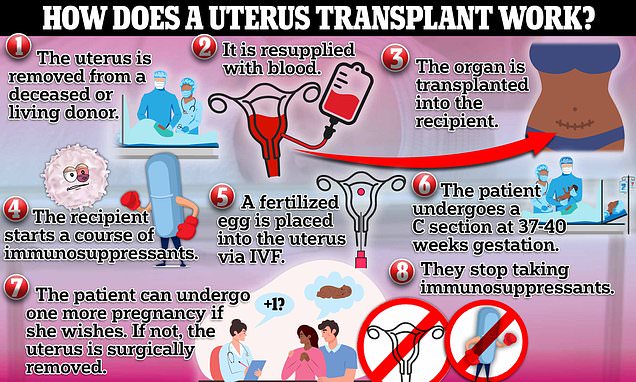Community Activist Suggests Live Womb Transplants For Transgender Mothers

Table of Contents
The Current Landscape of Transgender Pregnancy and Reproductive Options
Currently, the options for transgender men seeking pregnancy are limited, primarily revolving around in-vitro fertilization (IVF) with gestational surrogacy. This process, while providing a pathway to parenthood, presents significant challenges.
Challenges Faced by Transgender Men Seeking Pregnancy:
- Financial Burden: IVF and surrogacy are incredibly expensive, placing a significant financial strain on many couples. The costs can easily reach tens of thousands of dollars, making it inaccessible for many transgender individuals.
- Emotional Toll: The process of IVF and surrogacy is emotionally taxing, often involving multiple attempts, hormonal treatments, and the emotional complexities of involving a third party in the creation of one's family. The emotional investment is considerable, and the potential for disappointment is high.
- Limited Access: Access to fertility treatments, including IVF and surrogacy, varies widely depending on location, insurance coverage, and other factors. This disparity in access exacerbates the challenges faced by transgender men seeking pregnancy.
- Legal complexities: Navigating the legal aspects of surrogacy can be incredibly complex, varying greatly between jurisdictions. This adds another layer of stress and uncertainty to an already challenging process.
Live Womb Transplants: A Potential Solution?
The activist's suggestion of live womb transplants presents a radical alternative. This theoretical procedure involves transplanting a uterus from a living donor into a transgender recipient, enabling them to carry a pregnancy. While this sounds like science fiction, it's important to examine the possibilities and limitations.
The Science and Feasibility of Live Womb Transplants:
Live womb transplants are based on the existing practice of uterine transplantation. While successful uterine transplants have been performed, allowing cisgender women to carry pregnancies, adapting this procedure for transgender men presents significant technical and medical obstacles. Challenges include:
- Immunological Rejection: The recipient's body might reject the transplanted uterus, leading to complications and the need for lifelong immunosuppressant drugs.
- Surgical Complexity: The surgery itself is incredibly complex and carries substantial risks. The success rate, even in cisgender women, remains relatively low.
- Lack of Research: Currently, there is a paucity of research specifically on the application of live womb transplants to transgender men, creating considerable uncertainty.
Ethical Considerations and Public Opinion
The proposal sparks intense ethical debates and public discussion.
Ethical Debates Surrounding Live Womb Transplants:
- Donor Consent: Ensuring truly informed and voluntary consent from uterus donors is paramount. The emotional and physical burdens on the donor must be fully understood and respected.
- Potential Exploitation: There’s a concern that vulnerable individuals might be coerced into donating their uteruses. Robust safeguards are crucial to prevent exploitation.
- Reproductive Rights: The debate touches upon broader questions about reproductive rights and access to reproductive healthcare for transgender individuals.
Public Perception and Societal Acceptance:
Public opinion on live womb transplants for transgender mothers is likely to be divided. Religious objections, conservative viewpoints on gender roles, and a lack of understanding regarding transgender identities will undoubtedly contribute to societal resistance. Simultaneously, a supportive community exists for transgender individuals and their right to access reproductive healthcare, which could lead to increased acceptance over time.
Alternative Solutions and Future Directions
While live womb transplants represent a daring proposition, other advancements in reproductive technology offer potential alternative solutions.
Exploring Alternative Technologies:
- Improved IVF Techniques: Continued research into IVF could lead to more efficient and less invasive procedures, improving success rates and reducing costs.
- Advancements in Artificial Wombs: The development of artificial wombs is a promising area of research that could revolutionize reproductive healthcare, potentially offering an alternative pathway for transgender men to experience pregnancy.
Conclusion: The Future of Live Womb Transplants and Transgender Motherhood
The proposal of live womb transplants for transgender mothers presents a compelling yet ethically complex challenge. While the technology currently faces substantial hurdles, the desire of transgender men to experience pregnancy underscores the need for ongoing research and innovation in reproductive healthcare. The ethical considerations surrounding donor consent and potential exploitation must be thoroughly addressed. Furthermore, fostering open and informed dialogue about alternative solutions, such as improved IVF techniques and the development of artificial wombs, is essential. We must prioritize respectful and inclusive discussions around live womb transplants for transgender mothers, uterine transplantation for transgender parents, and innovative reproductive options for transgender individuals to ensure that all individuals have access to the reproductive healthcare that aligns with their identity and desires.

Featured Posts
-
 Ai Powered Figma A Deep Dive Into Its Competitive Advantages
May 10, 2025
Ai Powered Figma A Deep Dive Into Its Competitive Advantages
May 10, 2025 -
 Kucherovs Lightning Dominate Oilers 4 1 Victory
May 10, 2025
Kucherovs Lightning Dominate Oilers 4 1 Victory
May 10, 2025 -
 Loss And Legacy Reflecting On The Life Of Americas First Non Binary Person
May 10, 2025
Loss And Legacy Reflecting On The Life Of Americas First Non Binary Person
May 10, 2025 -
 Palantir Stock 40 Increase Predicted For 2025 Time To Invest
May 10, 2025
Palantir Stock 40 Increase Predicted For 2025 Time To Invest
May 10, 2025 -
 Nyt Strands Today April 4 2025 Clues And Solutions
May 10, 2025
Nyt Strands Today April 4 2025 Clues And Solutions
May 10, 2025
